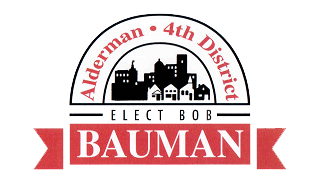Alderman Bauman is Committed to Creating a More Resilient and Sustainable Milwaukee

Alderman Bauman Co-sponsored the Climate and Equity Plan
On June 20, 2023, the common council approved the city’s Climate and Equity Plan (the “Plan”) (file # 221233) culminating a multi-year process conducted by the City-County Task Force on Climate and Economic Equity. The Plan addresses the pressing issue of greenhouse gas emissions and the urgent need to combat climate change while promoting equity within the city. The plan acknowledges the transformative impact of climate change on the Earth's atmosphere and emphasizes the heightened vulnerabilities faced by low-income communities, who are disproportionately affected by environmental hazards such as extreme weather events, flooding, and excessive heat days. The Plan envisions a future where Milwaukee takes decisive action to address climate issues while fostering inclusivity. The key objectives are:
Reduce Greenhouse Gas Emissions: The plan outlines a target to achieve a 45% reduction in community greenhouse gas emissions by 2030, with a long-term aspiration of achieving net-zero emissions by 2050.
Promoting Racial and Economic Equity: The plan aims to enhance racial and economic equity by generating well-paying green jobs (with a minimum annual income of $40,000) that prioritize the recruitment of local individuals from communities of color.
To realize these goals, the plan sets forth "10 Big Ideas for Action," each representing a strategic approach to be implemented by government entities, businesses, community-based organizations, and other partners. The financial backing for these initiatives will largely come from new federal resources, including the Inflation Reduction Act, aligning with the federal Justice40 Initiative that seeks to address environmental and economic disparities.
Selected Big Ideas from the Milwaukee Climate and Equity Plan:
Green Jobs Accelerator: This initiative aims to increase the representation of people of color in well-paying green jobs by creating clear pathways for career progression, establishing public benefits agreements for government-funded projects, and supporting businesses owned by individuals of color in the green sector.
Healthy Home Energy Upgrades: By making weatherization and renewable energy retrofits more affordable, this approach not only enhances housing but also addresses health hazards such as lead-based paint.
New Net-Zero Energy Homes: The plan envisions the construction of affordable, healthy, net-zero energy homes on vacant lots, stimulating local manufacturing job opportunities and lowering construction costs.
Commercial Building Energy Benchmarking and Performance Standards: This initiative involves annual tracking and reporting of energy use by large commercial building owners, promoting longer-term standards to progressively reduce greenhouse gas emissions.
People-Centered Transportation and Urban Design: Through improved public and active transportation options and transit-oriented development, this approach encourages reduced reliance on private vehicles.
Electrify Transportation: A network of public electric vehicle charging stations, coupled with public outreach and transitioning municipal fleets to low-emission vehicles, promotes the adoption of electric vehicles.
Greening the Electric Grid: Milwaukee aims to transition to carbon-free energy sources by advocating for renewable energy policies, direct purchase of renewable energy, and expanded rooftop solar installations.
Protect and Restore Nature in the City: Efforts to enhance green spaces, protect natural areas, and reduce urban heat islands include expanding the Green and Healthy Schools Program and addressing excess asphalt in commercial parking lots.
Waste Reduction and Sustainable Consumption: Initiatives to reduce waste involve redirecting surplus food to feed communities, reducing plastic pollution, and exploring sustainable alternatives to traditional construction materials.
Resilience Ambassadors: Collaborating with local organizations, this initiative empowers underserved communities to enhance their climate resilience through accessible tools and resources.
To learn more about the plan, visit the website: https://city.milwaukee.gov/climate/Climate-Plan
Alderman Bauman has sponsored or co-sponsored several other legislative initiatives designed to address climate change and advance the Climate and Equity Plan such as:
Resolution (file # 230444). This resolution urges the Wisconsin Attorney General to initiate legal action against the fossil fuel industry, thereby joining several other states and governmental entities, to seek accountability for climate damage and proactive steps to mitigate climate change and ensure equitable access to opportunities in the emerging clean energy economy.
The Deconstruction Ordinance (file # 170188). This legislation represented a major change in city demolition policy to promote job creation and sustainability. The ordinance requires the deconstruction of most one to four family residential structures built before 1930, designated historic structures, and structures in history districts that are slated for demolition. Those structures must be dismantled manually instead of using back hoes and bull dozers that basically destroy the building materials.
Deconstruction will help create family supporting jobs for entry level workers since deconstruction is much more labor intensive than mechanical demolition. In addition, taxpayers will save money because the city will not have to pay tipping fees to dump demolition material in landfills. Finally deconstruction will enable the salvaging of valuable high quality old growth lumber and other building materials for reuse in new construction.
The main challenge to this program is developing a commercial market for the salvage material. As such markets develop; the city anticipates offsetting the higher cost of deconstruction with the proceeds from the sale of these materials. This ordinance applies to the demolition of both city owned and privately owned properties.
Ordinance (file # 221725) directing city departments to begin the process of purchasing low emission and zero emission vehicles for the city’s fleet.
Resolution (file # 231341) that accepted a $12m federal grant to increase the city’s tree canopy and establish a training program for forestry jobs.
Communication file that discussed the city’s ability to require air conditioning in newly constructed residential units to address the public health impacts of heat waves.
Legislative actions that approved the investment in back up power generating capacity for the Milwaukee Water Works facilities to insure that drinking water service and fire suppression service is not interrupted during severe storms when utility service is lost.
Legislation that approved renewable energy installations (solar) on city buildings and real estate.
Legislation directing the Office of Environmental Collaboration to seek federal grants to increase the availability of EV charging stations throughout the city.
Communication files exploring ways to increase the recycling of single use plastic through the city recycling program.
Communication files exploring ways to institute a city wide composting service.
Communication files exploring ways to recycle and reuse wood from removed city trees.
Communication files explores ways to reduce storm water runoff, reduce inflow and infiltration of sewer laterals, increase use of permeable pavement, increase use of storm water gardens and bio swales, and downspout disconnection programs.
Communications files exploring changes to the building code and the specifications the city uses for rehabbing city owned properties to improve the sustainability of new residential construction, achieve improvements in energy efficiency and work toward net zero and all electric residential units.
